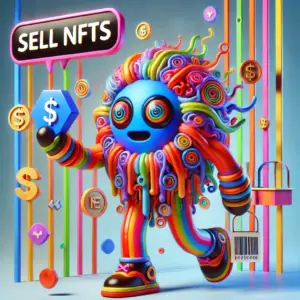The world of real estate has always been steeped in tradition. Physical ownership, contracts signed with pen and ink, and meticulous paperwork are staples of the industry. However, the digital revolution has begun to disrupt this age-old model, ushering in an era of innovation and efficiency. At the forefront of this transformation lies the burgeoning technology of Non-Fungible Tokens (NFTs), which promise to reshape how we buy, sell, and manage property.
NFTs, unique digital assets recorded on a blockchain, are no longer limited to the realm of digital art and collectibles. The real estate industry is embracing this transformative technology, paving the way for a new era of ownership, transparency, and accessibility.
Table of Contents:
Unveiling the Potential: How NFTs are Revolutionizing Real Estate
The application of NFTs in real estate is vast and multifaceted, offering a range of benefits for both buyers and sellers. Let’s delve into some key aspects of this disruption:
Fractional Ownership: Democratizing Access
Imagine owning a piece of a luxury vacation home in the Bahamas or a sprawling commercial property in Manhattan, without the hefty price tag. NFTs offer a solution to the age-old problem of affordability in real estate. Fractional ownership, made possible through NFTs, allows investors to purchase a portion of a property, unlocking access to previously unattainable assets. This democratizes ownership, making it possible for a wider audience to participate in the real estate market.
For example, a high-end apartment building could be tokenized into hundreds of NFTs, each representing a specific percentage of ownership. This allows individuals to invest in a piece of prime property with a significantly lower entry barrier. Moreover, fractional ownership through NFTs provides investors with a more liquid investment opportunity. They can easily trade their tokens on secondary markets, allowing them to sell their stake anytime, akin to trading stocks.
Smart Contracts: Automated Transactions, Enhanced Security
Smart contracts, self-executing programs stored on the blockchain, are revolutionizing the way real estate transactions are conducted. These contracts automate the entire process, from property transfer to payment processing, significantly reducing the time and cost associated with traditional methods. The immutable nature of blockchain technology ensures transparency and eliminates the potential for fraud, making transactions more secure and trustworthy.
Smart contracts can also automate rent collection, property management, and even enforce lease agreements. This eliminates the need for a middleman, further streamlining the process and minimizing administrative burden. By automating these repetitive tasks, smart contracts free up time for real estate professionals to focus on providing personalized client services.
Tokenized Property: Streamlining the Buying and Selling Process
Tokenizing property through NFTs simplifies the process of buying and selling real estate. Instead of relying on cumbersome paperwork and lengthy legal procedures, buyers and sellers can transact directly on a decentralized platform, facilitated by smart contracts. This eliminates the involvement of intermediaries like lawyers and escrow agents, significantly reducing costs and time delays.
Tokenized property also provides greater transparency and accountability. All transaction records are permanently stored on the blockchain, making them easily verifiable and auditable. This eliminates the risk of falsified documentation and provides buyers with a clear understanding of the property’s history and ownership chain.
Enhanced Transparency and Data Management
NFTs can empower real estate professionals with granular control over property data. They can create unique tokens representing a specific property, embedding crucial information like ownership details, maintenance records, and even environmental certifications directly into the token. This eliminates the need for fragmented data silos, creating a centralized repository of information that is easily accessible to all stakeholders.
Imagine a homeowner accessing their property records through a secure blockchain platform, tracking energy consumption, scheduling maintenance, and managing tenant information at their fingertips. This level of transparency and accessibility empowers homeowners, while also providing valuable insights for developers and property managers.
Unlocking New Revenue Streams: NFTs and the Metaverse
The metaverse, a virtual world where users can interact and engage through digital representations of themselves, is poised to become a powerful force in the real estate industry. NFTs play a crucial role in this evolution, enabling the creation of virtual property, such as virtual land, buildings, and even entire cities. This virtual real estate can be bought, sold, and rented, generating new revenue streams for developers and investors.
Imagine purchasing a piece of virtual land in a popular metaverse and building a virtual shopping mall, a concert venue, or even an art gallery. These virtual properties can be monetized through advertising, events, and other revenue-generating activities. The metaverse presents a limitless canvas for innovation, opening up exciting possibilities for real estate investment and development.
Challenges and Considerations
While the potential of NFTs in real estate is undeniable, there are certain challenges that need to be addressed. Understanding these issues is crucial for ensuring the responsible and sustainable adoption of this technology.
Regulatory Landscape: The Need for Clear Guidelines
The nascent nature of NFTs in real estate necessitates clear regulatory frameworks. While some jurisdictions are actively exploring the legal aspects of this technology, others are lagging behind. Establishing defined regulations is critical for ensuring consumer protection, promoting transparency, and mitigating risks associated with this emerging market.
Clarity on tax implications, ownership rights, and legal considerations surrounding tokenized property is essential for building trust and confidence among investors and stakeholders. As the technology matures, the regulatory landscape will play a crucial role in shaping the future of NFTs in real estate.
Security and Scalability: Addressing the Challenges of Blockchain
The security of blockchain technology is paramount, as it underpins the entire system of NFTs. Ensuring robust security mechanisms to combat potential hacks and frauds is essential for building trust and investor confidence. Furthermore, scalability is a key concern, as the growing demand for tokenized property could strain the capacity of existing blockchain platforms. Developers must find ways to enhance the scalability of blockchain networks to handle the increasing volume of transactions.
Addressing these challenges through innovative solutions like layer-2 scaling and advanced security protocols is crucial for ensuring the smooth and efficient adoption of NFTs in real estate.
Interoperability: Bridging the Gap Between Platforms
The current landscape of blockchain platforms is fragmented, with various technologies operating in silos. This lack of interoperability can pose challenges for users navigating different platforms, potentially hindering seamless transactions and data exchange. Developers need to proactively work towards establishing interoperability standards, enabling seamless connectivity and data transfer between different platforms.
A unified platform that bridges the gap between disparate ecosystems will foster greater adoption and facilitate the emergence of a robust and interconnected real estate ecosystem powered by NFTs.
The Future is Bright: A Glimpse into the NFT-Powered Real Estate Landscape
NFTs in real estate are poised to transform the industry, ushering in a new era of ownership, transparency, and innovation. The benefits of this technology are far-reaching, offering a range of advantages for both buyers, sellers, and investors.
Here’s a glimpse into the future of NFT-powered real estate:
- More Accessible Ownership: NFTs will continue to democratize ownership, allowing individuals to invest in real estate with significantly less capital, opening up new opportunities for participation in the market.
- Seamless Transactions: The adoption of smart contracts will further streamline the buying and selling process, reducing transaction times and costs while enhancing security.
- Data-Driven Insights: NFTs will empower real estate professionals with access to real-time data, enabling better decision-making, efficient property management, and more accurate market assessments.
- Emergence of the Metaverse: Virtual real estate in the metaverse will become a reality, offering investors new avenues for creating and monetizing digital assets.
- Sustainable Real Estate: NFTs could play a crucial role in promoting sustainable practices. Tokenized properties could be linked to environmental certifications, allowing investors to assess the sustainability of their investments.
While challenges remain, the future of NFTs in real estate is undoubtedly bright. The technology has the potential to unlock new possibilities, revolutionizing the way we buy, sell, and manage property. As the technology matures and adoption grows, we can expect to see increasingly innovative applications and a thriving ecosystem of NFT-powered real estate solutions.
Conclusion
NFTs in real estate are not just a technological advancement but a paradigm shift that is poised to redefine the industry. The benefits of this technology are numerous, offering greater transparency, efficiency, and accessibility for all stakeholders. As regulatory frameworks solidify, security concerns are addressed, and interoperability standards are established, NFTs will continue to transform the real estate landscape, paving the way for a more innovative, inclusive, and sustainable future.
Q&A
What are the main benefits of using NFTs in real estate?
Using NFTs in real estate offers numerous benefits:
Democratized ownership: Fractional ownership through NFTs allows individuals to invest in real estate with significantly less capital, opening up new opportunities for participation in the market.
Automated transactions: Smart contracts streamline transactions, reduce transaction times and costs, and enhance security.
Enhanced transparency: NFTs provide a clear and permanent record of ownership and transaction history, increasing transparency in the market.
Data-driven insights: NFTs enable real estate professionals to access real-time data, enabling better decision-making and more accurate market assessments.
New revenue streams: NFTs facilitate the creation of virtual property in the metaverse, opening up new avenues for investment and monetization.
Sustainability: NFTs can be linked to environmental certifications, allowing investors to assess the sustainability of their investments.
What are some potential challenges associated with NFT adoption in real estate?
While the potential of NFTs in real estate is significant, challenges exist that need to be addressed:
Regulatory landscape: The absence of clear regulatory frameworks can create uncertainty and limit adoption.
Security and scalability: Ensuring robust security mechanisms and scalable blockchain solutions is essential for building investor confidence and preventing fraud.
Interoperability: Lack of interoperability between blockchain platforms can hinder seamless data exchange and transactions.
Infrastructure: Building the necessary infrastructure to support NFT-based real estate transactions requires significant investments and collaboration across the industry.
How will the future of real estate be impacted by NFTs?
The future of real estate with NFTs promises to be transformative:
More accessible ownership: Fractional ownership and tokenized property will make real estate investments more attainable for individuals.
Seamless and transparent transactions: Automated transactions will streamline the buying and selling process, reducing time and costs.
Data-driven insights for better decision making: Real estate professionals will have access to real-time data for improved market analysis and management.
The emergence of the metaverse: Virtual real estate will become a thriving market with new opportunities for investment and development.
Sustainable practices: NFTs could be used to promote sustainable real estate practices by verifying environmental certifications and tracking energy consumption.






